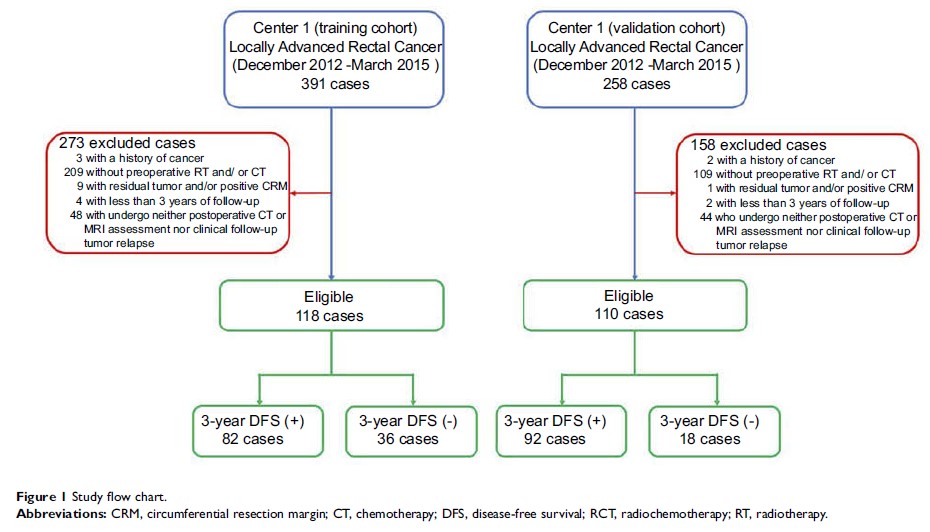9 7 8 1 6
论文已发表
注册即可获取德孚的最新动态
IF 收录期刊
- 3.3 Breast Cancer (Dove Med Press)
- 3.4 Clin Epidemiol
- 2.5 Cancer Manag Res
- 2.9 Infect Drug Resist
- 3.5 Clin Interv Aging
- 4.7 Drug Des Dev Ther
- 2.7 Int J Chronic Obstr
- 6.6 Int J Nanomed
- 2.5 Int J Women's Health
- 2.5 Neuropsych Dis Treat
- 2.7 OncoTargets Ther
- 2.0 Patient Prefer Adher
- 2.3 Ther Clin Risk Manag
- 2.5 J Pain Res
- 2.8 Diabet Metab Synd Ob
- 2.8 Psychol Res Behav Ma
- 3.0 Nat Sci Sleep
- 1.8 Pharmgenomics Pers Med
- 2.7 Risk Manag Healthc Policy
- 4.2 J Inflamm Res
- 2.1 Int J Gen Med
- 4.2 J Hepatocell Carcinoma
- 3.7 J Asthma Allergy
- 1.9 Clin Cosmet Investig Dermatol
- 2.7 J Multidiscip Healthc

用于预测中国局部晚期直肠癌患者多中心队列无病生存率的诺模图
Authors Li ZH, Xie PY, Zhang DF, Li YJ, Wu L, Dong J, Xiao J, Liu ZY
Received 30 November 2018
Accepted for publication 1 March 2019
Published 29 March 2019 Volume 2019:11 Pages 2471—2483
DOI https://doi.org/10.2147/CMAR.S196614
Checked for plagiarism Yes
Review by Single-blind
Peer reviewers approved by Dr Cristina Weinberg
Peer reviewer comments 3
Editor who approved publication: Professor Nakshatri
Purpose: This
study aimed to develop and validate a nomogram for predicting 3-year
disease-free survival (DFS) among a multicenter cohort of Chinese patients with
locally advanced rectal cancer (LARC) who underwent preoperative therapy
followed by surgery. This nomogram might help identify patients who would
benefit from postoperative adjuvant chemotherapy and close follow-up.
Materials and methods: All data
from 228 patients in two independent Chinese cohorts (118 patients and 110
patients) were pooled and subjected to survival analysis. One cohort’s data
were used to develop multivariate nomograms based on Cox regression, and the
second cohort was used for external validation. The variables were sex, age,
clinical tumor stage, tumor location, preoperative therapy protocol, adjuvant
chemotherapy, surgical procedure, surgical approach, pTNM stage, tumor deposit,
tumor regression grade, lymphovascular invasion, perineural invasion,
pretreatment serum carcinoembryonic antigen (CEA) level, preoperative CEA
level, and postoperative CEA level. The model’s performance was evaluated based
on its discrimination, calibration, and clinical usefulness.
Results: The
nomogram was based on ypT stage and ypN stage, and the C-index values for
3-year DFS were 0.70 in the training cohort (95% confidence interval:
0.62–0.78) and 0.78 in the validation cohort (95% confidence interval:
0.68–0.89). The Hosmer-Lemeshow calibration test revealed good calibration for
predicting 3-year DFS in the training and validation cohorts, and decision
curve analysis demonstrated that the nomogram was clinically useful.
Conclusion: This
nomogram including the ypT stage and ypN stage could predict DFS at
3 years after surgery, which may help better identify Chinese patients who
would benefit from additional postoperative adjuvant systemic treatment.
Keywords: rectal
cancer, disease-free survival, recurrence, nomogram
